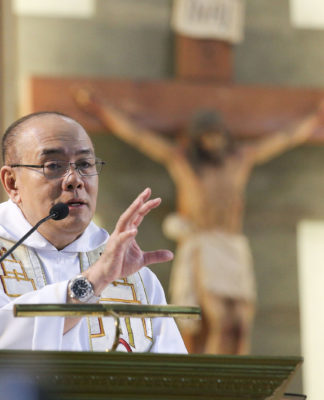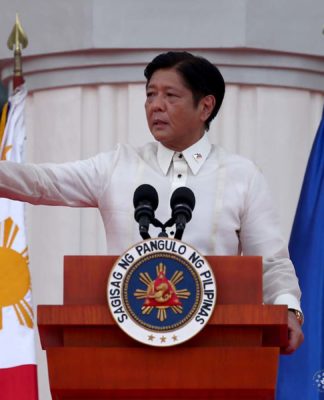 MANY a time has there been a debate on the relation of philosophy and theology, but only now has the concept “guardian of philosophy” arose, as one of the world’s best-known living French thinkers proposed it in the third World Congress on Philosophy held last Sept. 11 to 13.
MANY a time has there been a debate on the relation of philosophy and theology, but only now has the concept “guardian of philosophy” arose, as one of the world’s best-known living French thinkers proposed it in the third World Congress on Philosophy held last Sept. 11 to 13.
“We can discuss if philosophy has ever played the role of a servant of theology, but it does not seem absurd to suggest that theology plays the role of the ‘guardian’ of philosophy in order that philosophy may remain at the peak of its destiny (which is toward truth),” Jean-Luc Marion, one of the leading Catholic thinkers of the modern times, said as he closed in his inaugural lecture, “On the Foundation of the Distinction Between Theology and Philosophy,” for the Conférence Mondiale des Institutions Universitaires Catholiques de Philosophie (COMIUCAP) at the Ateneo de Manila University.
Earlier in his lecture, the former director of philosophy in the premier University of Paris IV (Sorbonne), speculated on the dilemma, which brought forth the clash of faith and reason.
“It could be in fact the case that the lack of precision of [philosophy and theology], indeed the confusion in the definitions, not only forbid any clarification of obscurities, but, constitutes in fact the heart of the problem,” he proposed, explaining that nobody exactly knew what one defended and against what.
He said it could be the usual criteria for the discrimination between the two, which caused the problem. And the abolition of the criteria might also mean the eradication of the conflict between the faculties.
End of metaphysics
Marion pinpointed the criteria emerging to be the vantage point of philosophy–the result of the system of metaphysics and the difference between the possible and the impossible–that resulted in a well-educated debate of the prior with another intellectual metaphysician and a plenary speaker of the congress, Lorenz Puntel of the University of Munich in Germany, during the open forum after the inaugural lecture.
Marion, somehow following his mentor, the late poststructuralist Jacques Derrida, claimed that contemporary philosophy could no longer devise its distinction with what it considered as theology due to the end of metaphysics.
This “end,” according to him, was due to the paradigm shifts that the course of thought had taken.
“It could be that philosophy itself can no longer guarantee the use of this distinction between the ontological and the ontical or the distinction between the possible and the impossible,” Marion said in his lecture.
Among the reactors to this claim was Puntel, who contended that metaphysics never died.
“In fact, what I have been writing over the years were metaphysics,” he said.
Concluding the prolific forum graced by renowned living thinkers, Marion stood with his notion of contemporary philosophy.
“As a matter of fact, contemporary philosophy is not only characterized by its critique on the different meanings but also and coherently by its abandonment of the concept of nature,” he said.
Other plenary speakers who graced the event were Friedo Ricken of the University of Munich, Frank Budenholzer from the Fu Jen Catholic University, and UST’s very own “Venerable Master” Alfredo Co.
‘Thinking congress’
To commemorate the encyclical Fides et Ratio (Faith and Reason) of the great Pope John Paul II, who adequately reconciled the allegedly clashing faculties, the COMIUCAP gathered distinguished thinkers from different countries across the globe.
This year’s theme, “Philosophy, Religions, and Transcendence,” is an aftermath of the first two world conferences.
After its foundation in 1999 in Rome, COMIUCAP had already two prior world gatherings. The first conference focused on “Philosophical Reason and Christianity,” and was held in Paris in 2000. The second was in Mexico in 2004 that tackled “Philosophy as Mediation.”
Now, the COMIUCAP has 80 member institutions from 35 countries after its foundation in Rome in 1999.
Indeed, it is momentous for UST to co-host this Third World Congress on Philosophy, which is the first in Asia, that drew at least 250 professors and students of philosophy from over 20 countries from five continents.
Together with Ateneo, the University hosted the event. Under the direction of UST Graduate School faculty secretary Prof. Michael Vasco and supervision of Faculty of Arts and Letters professor Fleurdeliz Altez, the organizing group, which includes philosophy students from the UST-GS, Faculty of Arts and Letters, and Ecclesiastical Faculties, the event was efficiently held in the University during the second day of the conference.
UST hosted the plenary session of Scannone in the Thomas Aquinas Research Center, which was followed by parallel workshops from selected local and foreign speakers. Also, it was in the University that the regional meeting took place.
During the closing dinner for the second day, the performers from the Ecclesiastical Faculties, Conservatory of Music, and the Salinggawi Dance Troupe captivated the congress delegates with their caliber performances, which was highly regarded by the dignitaries who attended the event.
“Your welcome at UST was really wonderful; so I’ll keep a deep memory of this event,” outgoing COMIUCAP World president Philippe Capelle said in an e-mail to UST’s organizing committee.

















